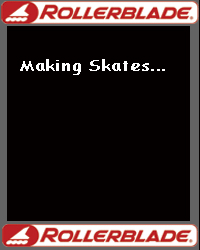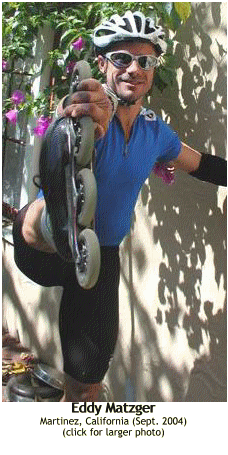 |  |  | ||||||||||||||||||||||||||||||||||||||||||||||||||||||||||||||||||||||||||
| ||||||||||||||||||||||||||||||||||||||||||||||||||||||||||||||||||||||||||||
Part 4: Eddy Matzger Interview ... In Which the Skate Legend Talks About ...
Robert: After 15 years of racing, Eddy, how do you keep your edge? Eddy: By always doing something different. For instance, lately I have been I love skating so much that I could skate all of the time and hurt myself. So the pool has become a way for me to relax and recover and still get a good cardiovascular workout. Robert: What else do you do? Eddy: I do a lot of "fartlek" training, which means using the things in your natural environment to make training fun. So, for example, if there's a squirrel running across the road, you chase it to the nearest tree. Or if you pass a picnic table, you run up and down it, and maybe do a back-scratcher off the top. The basics of fartlek is to vary your training routine, have fun and invent new things to do. That's why skating never gets old for me --- I invent new things to do all the time. Besides, how can something you love so much, that you do with your whole heart and soul, ever get old? Robert: What new things are you doing these days? Eddy: One thing I've been doing is skating on one leg as much as possible. If I am doing a night skate, for instance, I'll skate on one leg and when I get tired switch to the other. Another new thing this year --- I suppose my competitors shouldn't know this, but who cares? -- is that I skate with people on my back. I wear them like backpacks and then I skate up hills or do intervals. It makes you stronger. In soccer, we used to do it all the time. Someone would jump on your back, and you had to run to the top of a hill. Gosh! People ended up in tears. Robert: Skating on one leg is tough. ... How far can you go? Eddy: (He laughs.) We should try to set a Guinness world record on that. I bet I could go one mile. ... But you were asking about how to maintain your edge. Well, you just become more efficient and smarter about how you train. It used to be I would skate for six, eight hours a day, every day. But as I got better, I found shortcuts for training more efficiently and recovering more quickly from my last skate. Robert: How many hours a week do you spend training? Eddy: That depends on what I'm training for. Before the New York 100 K [on Sept. 25, 2004], I started training seriously when the Tour de France started [on July 3]. I said to myself, "If those guys are on their bikes for six hours a day, I'm going to try to train for six hours a day." And so I had my own personal Tour. I would split my training between skating, swimming and running and try to do six hours a day. At first it would wipe me out. But then my body got used to it. ... It's outrageous how big a workload a body can do! Robert: How do you know when you are over-training? Eddy: You lose your motivation to get out there and do what you love! ... When your body tells you something, you have to listen. I used to be a slave to a heart-rate monitor, but then I got to know my body. Now I wake up in the morning and do yoga. If my balance is good, then I know I have slept well and can pile on the training. If I am not quite on, I back off a little. Robert: Do you do something special to prepare yourself mentally for races? Eddy: I don't get all worked up before races anymore. I used to get really nervous and have butterflies and pull up to the starting line and think, "I just forgot everything I ever knew about skating!" But when you do 25 races a year, it gets to be a fairly normal thing. And you realize that there's nothing you can do before a race but get a good night's sleep. It's not that I'm not excited anymore. It's just that I know that a race is the culmination of all your hard work and preparation, and there is nothing you can do about it right before the start of a race. And when the gun goes off, there's no more time to be nervous. Because then you are just in the moment. You have forgotten all your nervousness and butterflies, and you are just acting on impulses. Continued ... | Discuss: Related Reading • Intro to The Eddy Matzger Interview
• Racing News | |||||||||||||||||||||||||||||||||||||||||||||||||||||||||||||||||||||||||||
... Copyright © 2006 by Robert Burnson | ||

